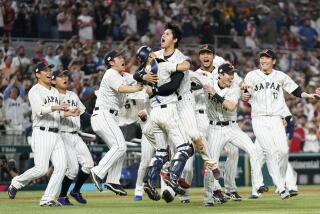Will the Games of Future Be Goodwill or Olympic? : Turner, Soviets May Plan a Coup, but for Now, Signs Point to Coexistence
MOSCOW — There is a theory about the Goodwill Games that Ted Turner and Soviet officials deny and that the International Olympic Committee considers preposterous. But because it has received so much attention both here and in the United States, it is worthy of exploration.
According to the theorists, the Eastern Bloc, led by the Soviet Union, will boycott the 1988 Summer Olympics at Seoul, South Korea, thus striking another telling blow, if not a mortal one, to the Olympic movement.
Then the Soviets and their Iron Curtain comrades will attend the 1990 Goodwill Games at Seattle, giving those games, in their second go-around, the distinction of new, improved Olympics. Turner and the Soviets would be the proud co-owners. Or so the theory goes.
No neutral observer should simply dismiss the theory without giving it a second thought. From all we know about Turner and the Soviets, they certainly are capable of hatching such a plot.
Neither Turner nor the Soviets appear to have designs on the Olympics at this juncture. And if you can believe the public statements of IOC President Juan Antonio Samaranch, the IOC does not feel threatened, although the feelings of the United States Olympic Committee may be another matter.
In an interview last week, Turner said the Goodwill Games were not created to replace the Olympics.
“All we want to do is be a supplement to the Olympics,” he said. “In the early days, the ‘Chariots of Fire’ times, it took a month to get to the Olympics and a month to get home. Nobody wanted to go through that more than once every four years.
“But it’s so easy to travel from one side of the world to the other today that there’s no reason not to have a big event like this every two years.
“I don’t think this is going to hurt the Olympics. I think it’s going to help by giving Olympic athletes more television exposure. Do you think baseball would be as popular if the World Series was held only once every four years?”
Indirectly, Turner might have hit upon one reason that the Goodwill Games will probably never rival the Olympics. Because there is a World Series every year, and a Super Bowl and a Final Four and Kentucky Derby, etc., sports fans in the United States may not want an Olympic-type event every two years. Once every four years seems to be enough, just as with presidential elections.
But Turner has overestimated the appeal of the Goodwill Games all along. Giving him the benefit of the doubt, it is probable that his claim that the Goodwill Games will eventually be bigger than the Olympics was a bold marketing statement, intended to influence advertisers. They were unimpressed, proving once again that advertisers usually are more intelligent than their advertisements.
Even Turner admits that television ratings have been “pretty soft.”
What they actually have been is abysmal.
That has led to speculation that there will not be any Goodwill Games in 1990. More pertinent is whether there will be a WTBS, at least one that is owned by Turner.
He is in such a grave financial situation that the $10 million to $15 million he is losing on the Goodwill Games is insignificant, although advertising industry analysts contend it could be as high as $35 million. Turner recently was $2 billion in debt, but he said last week that he hopes to have the figure down to $600 million by the end of August.
Unless there is a catastrophe, there will be Goodwill Games in 1990, Robert Wussler, WTBS executive vice president, has insisted. He said contracts have been signed that financially obligate both WTBS and the Soviets to a rematch in Seattle.
That is not an exciting prospect for the USOC, which sponsors the Olympic Festival, formerly known as the Sports Festival, for U.S. athletes each summer, except in Olympic years. USOC officials predict that the Goodwill Games in Moscow will not adversely affect the Olympic Festival starting next week in Houston, but the 1990 Goodwill Games in Seattle would be in direct competition.
Perhaps the USOC and Turner will agree to a compromise before then, one that might involve Soviet teams participating in the Olympic Festival once every four years.
Actually, the USOC and the Soviets set that in motion by signing a mutual understanding last year, even before there were Goodwill Games. As a result, the Soviets are sending athletes in three sports to the Olympic Festival this summer.
That the Soviets are cooperating with the USOC hardly indicates a desire on their part to undermine the Olympic movement. Their attitude, indeed, appears to be the opposite, to the point of beginning a campaign, still unofficial at this point, to bring the 1996 Winter Olympics to Leningrad.
With that at stake, it is doubtful that the Soviets want to alienate the IOC.
Because there would be no quicker way to alienate the IOC than by leading another boycott, it is likely that the Soviets will be in South Korea in the summer of 1988.
The Soviets cannot make that a firm commitment at this point because of their alliance with North Korea, which is attempting to gain concessions from the IOC that would shift some sports from Seoul to Pyongyang.
So far, the only two countries indicating that they would boycott over the issue are Cuba and Ethiopia. And if the situation is not resolved, the Soviets probably would leave the North Koreans twisting in the wind.
As the Soviets are well aware, the political reality is that they probably could not lead another boycott of Eastern Bloc countries. Several of those countries did not want to boycott the 1984 games but did so out of solidarity.
The East Germans, in particular, have been adamant about being at Seoul. They apparently believe that another boycott would cost them a generation of athletes and unravel the so-called “miracle machine” that they have built in sports.
East German officials still resent Marat Gramov, the chairman of the Soviet sports committee. They believe that he did not do enough to prevent the 1984 boycott, which is one reason they responded half-heartedly when he appealed to them to support the Goodwill Games.
But no matter how optimistic IOC officials are that there will not be another Soviet-inspired boycott, the mating dance must continue.
For that reason, Samaranch was in Moscow last week, and so as not to offend the Soviets, he praised the Goodwill Games to the skies.
“The organizers in Moscow are helping sport, helping understanding between nations and are also helping the Olympic movement,” he said during a press conference.
At the same time, he said, the Goodwill Games are not a threat to the Olympics.
“The Olympic Games are the Olympic Games,” he said. “There can be no rivalry. The most important thing for any athlete is to get an Olympic medal. Ask anybody.”
Samaranch was well received.
When he came to Moscow in 1984 to appeal to the Soviets to reconsider their decision to boycott, the only official who would see him was Gramov. That was considered an insult to Samaranch, the Spanish ambassador to the Soviet Union for 3 1/2 years. Everyone knew that the government, not the sports committee, had made the decision to boycott.
Last week, Samaranch was greeted by Andrei A. Gromyko, president of the Soviet Union.
To readers of Soviet tea leaves, that was a statement that the Soviets are one with the IOC, at least for now.
More to Read
Go beyond the scoreboard
Get the latest on L.A.'s teams in the daily Sports Report newsletter.
You may occasionally receive promotional content from the Los Angeles Times.






